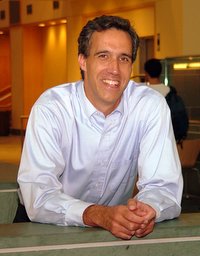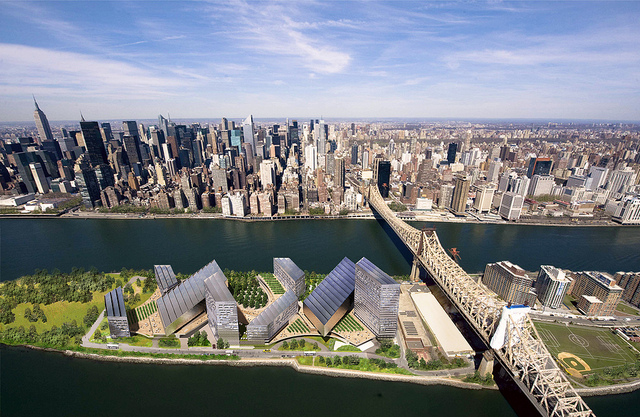Cornell University has won the bid to build the big new technology campus on Roosevelt Island that New York City has been looking to create. The plan is to foster a strong technology ecosystem by bringing in lots of talented technical people and have them focus on building innovative businesses on top of the traditional industries in the city.
So I got on the phone with Daniel Huttenlocher after the press conference in New York earlier today, to get some more details about what his university is aiming to accomplish.
As the dean of the Faculty of Computing and Information Science (CIS), and a distinguished computer science professor at the University, he’s been in the middle of the effort to get the new campus. In the extensive interview below, he provides more details on the types of students that the school will be looking for, and how he sees it adding to the development of a strong technology ecosystem in the city. As he explains, no one fully understands what makes an ecosystem form, but good technical schools are clearly a component — that New York could use more of.
Huttenlocher has the right background for the job ahead. His research spans computer vision, autonomous vehicles, social networking communication, and software development management. He has 22 patents and more than 50 published papers. He’s also been involved with a few tech companies throughout his career. You can find out more about him here.
Officially called the NYCTech Campus, the facilities will be a joint effort with Technion-Israel Institute of Technology. The plan is to begin moving in by 2017, and finish constructing 1.3 million of the 2 million square foot facility by 2027. In 20 years or so, the campus is expected to have 2,500 students and 280 professors.
The expectations are high, and reflect the city’s efforts to iterate beyond its traditional industries like finance and advertising. A new study by New York City projects that the campus will generate above $23 billion in economic activity, along with $1.4 billion in tax revenue over the coming 30 years. In terms of job creation, construction will account for 20,000 near-term jobs, and the campus will provide 8,000 permanent ones. The study also estimates that some 600 companies will be spun out, that create another 30,000 jobs. To boost all of this, the campus will also introduce a $150 million fund for New York City startups. (Official announcement here, and more campus images here.)
TechCrunch: Now that the deal is finalized, can you tell me more about the steps Cornell is taking to help New York’s tech ecosystem?
Daniel Huttenlocher: Any successful tech ecosystem in any city has its own characteristics. There’s already a fairly vibrant one in New York but it’s “adolescent” in the sense that it’s not at the scale of Silicon Valley or even Seattle or Boston. But there’s definitely a lot here.
Our approach is to take what we think is unique and look at what kind of role we can play. In terms of the unique parts of the ecosystem, the tech world is undergoing major shifts. Historically, the new technologies that have driven things have been pure tech plays. Increasingly, the value of tech is not coming as much from the pure tech side, and much more from people who deeply understand who to take it and transform something.
Amazon is my favorite example. It’s a tech company and a retailer, and you can’t separate the two.
In New York City, that’s really the huge advantage — the presence of all these other industries.
TechCrunch: Can you tell me more specifically how Cornell’s academic programs are going to be playing a part in all this?
Daniel Huttenlocher: Academically, we’re looking at shifting away from traditional university campus disciplines. There’ll be key disciplines involved — computer science, electrical engineering, operations research, applied math — but those disciplines need to be in the context of other disciplines where tech is being applied…. hubs that combine tech and other fields. In media, for instance, there are relevant areas of the social sciences, like sociology and psychology.
It’s about building interdisciplinary groupings that focus on these domains — Connective Media, Healthier Life, and the Built Environment. That second one isn’t just health care, but things like lifestyle types of apps. The third is about smart building technology, green buildings.
If you look at startup companies in New York, there’s certainly media. That’s a big, active area in the city’s economy.
For health, you’re seeing some startups there. But I’d say it’s the leading edge of the startup world. Then with green tech, that’s the bleeding edge, and there are relatively few companies. There’s a lot of growth potential in all these areas from a jobs perspective, and we see the academic areas that support them are not pure tech.
The degrees offered — masters and PhDs — will require students to apply to the New York campus, based mainly on their interests in terms of faculty and programs. They’ll have significant entrepreneurship and business requirements. Students need to be interested in that. For those who want pure tech, there’s Ithaca [Cornell’s home campus].
The faculty is also going to be a mix of those only in the city and some who are spending time on each campus. I’m personally spending a lot of time in the city and may end up there.
One of the defining features is that students will have mentors. There are 50,000 alumni in the New York, with a significant portion in businesses where tech is playing an increasingly important role. Each students will have a local mentor working in business just like a student on a campus has a faculty advisers. We want students to come up with new ways of thinking based on things they’ve learned very recently, that have commercial potential.
TechCrunch: What have you learned from already having the medical college in New York?
Daniel Huttenlocher: It really helped give us confidence in the practicality of all of this. The number of faculty who own joint appointments in both places, that have labs in both places — we realized we could do the same for technical fields.
We’re also operating other large academic institutions in New York City, and we’re experienced with other aspects — constructing buildings, fundraising, etc.
When talking to the mayor [Michael Bloomberg], one of the big components is that we’d have an academic vision tailored to the city. Our alumni are also unbelievably supportive of it. [Deputy Mayor for Economic Development Robert K. Steel] has joked that out of our 50,000 local alumni, most have called him already to encourage the deal.
TechCrunch: Do you know why Stanford pulled out?
Daniel Huttenlocher: While this all turned in to a competition — at least to some people — every school that’s participated is great. It’s about finding the right match, not about which is better. I have a lot of really good friends at Stanford. And they may also end up here some day.
TechCrunch: How are you going to define success in terms of the New York innovation ecosystem? It’s not always obvious how academic work translates to new companies. And looking at Silicon Valley, it wasn’t just Stanford that made the place what it is — there were people experimenting with radio in the 20s, and the semiconductor industry in the 50s.
Daniel Huttenlocher: I know quite a bit about that. I worked at Xerox PARC in the late 80s and early 90s. What’s interesting about tech in Silicon Valley is that a lot of innovation comes outside of some corporate entities. Xerox, Fairchild Semiconductor and Paypal have all been incredible cauldrons of innovation, with literally dozens of companies spinning out of each.
What causes those things to happen? I don’t think anybody understands yet. Some of it comes from having the right universities around. Some of it comes from companies. The whole ecosystem creation process is, frankly, very poorly understood. What we think is clearly absent in New York City right now is enough of the right kind of engineering talent.
Everyone has a hard time hiring good software engineers — in the valley and everywhere else. New York has that problem much more than elsewhere in the country, it really needs that kind of tech talent. That’s what we view we’ll bring to the table very quickly.
Develpoing a vibrant ecosystem comes from having multiple companies at multiple stages of development, and will come from places you don’t expect.
[At this point in the phone interview, Huttenlocher is interrupted by his partners at Technion leaving the room, and I overhear them say an appropriate departing line: “now we start the real work.”]
TechCrunch: So tell me about classes starting next September. That seems like an aggressive schedule.
Daniel Huttenlocher:The plan is to start operating more or less immiediately. We’re starting to look for new [temporary] space, with some leased already, and some possibilities for others. Cornell has a lot of operations in the city already, including the medical college and architecture school. It’ll probably involve leasing additional space. We need to start attracting the good engineering talent, and we need a neutral meeting ground for all of the companies.
That’s an important role that Stanford plays in the Valley. It helps people come together outside of the domain of one corporate entity or venture firm. We want to play that role quickly. We’ll start having students down here as soon as we find space, and certainly by the fall.
Some of that will depend on admissions and other things that take time. Some students will already be at Cornell, who it’d make sense to bring down and start working with companies.
Although, a lot of the young startups in the city already have Cornell engaged with them. I’ve personally had meetings with more than 200 people in the local tech industry in the last few months. So it’s a matter of how do we really start to engage with the companies, and get them hooked up?
TechCrunch: Any parting thoughts?
Daniel Huttenlocher: Yeah. We’ve gotten ourselves as a world into a place where we’re not creating enough good jobs. This isn’t really just about New York. It’s really about global innovation. Every city has its own flavor, that people identify with, and that helps to create great new companies. I mean, this won’t stop me from spending quality time in Silicon Valley…. If we can get a bunch of tech-oriented cities, that’s good for everyone.

